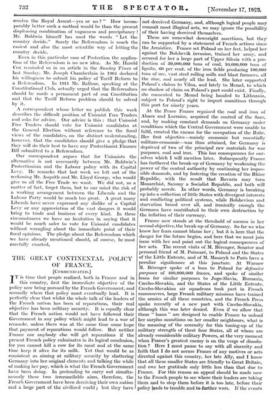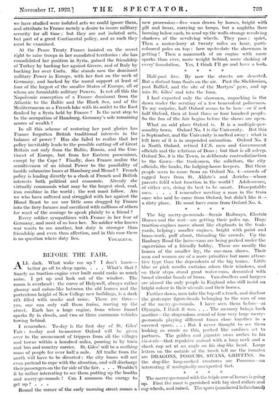THE GREAT CONTINENTAL POLICY OF FRANCE.
[COMMUNICATED.] TT is time that people realized, both in France and in this country, first the immediate objective of the policy now being pursued by the French Government, and secondly where that policy must eventually lead. It is perfectly clear that whilst the whole talk of the leaders of the French nation has been of reparations, their real objective has been military security. It is equally clear that the French nation would not have followed their Government in any policy which might lead to a. war of revanche, unless there was at the same time some hope that payment of reparations would follow. But neither France nor anybody else- will get reparations if the present French policy culminates in its logical conclusion,. for you cannot kill a cow for its meat and at the same. time keep it alive for its milk. Yet that would be as consistent as aiming at military security by shattering Germany into her original elements and talking the while of making her pay,. which is what the French Government have been doing. In pretending to carry out simulta- neously these two irreconcilable aims, therefore, the French Government have been deceiving their own nation and a large part of the civilized world ; but they have not deceived Germany,. and,, although logical people may commit most illogical' acts, we may ignore the possibility. of their having deceived- themselves.
These are somewhat. downright assertions, but they can be supported by a statement of French actions since the Armistice. France set Poland on her feet, helped her against the Bolshevik invasion, trained her army, and secured for her a large part of Upper Silesia with a pro- duction of 30,000,000 tons of coal, 10,000,000 tons of lignite, 60 per cent, of the iron fields producing 100,000 tons of ore, vast steel rolling mills and blast furnaces, all the zinc, and nearly all the lead. She later supported Poland's claims to Vilna, and lately to Memel, to which no shadow of claim on Poland's part could exist. Finally, she consented to Memel' being handed to Lithuania, subject to Poland's right to import munitions through this port for ninety years.
At the Peace France regained the coal and iron of Alsace and Lorraine, acquired the control of the Saar, and, by making constant demands on Germany under conditions which the Central Government were unable to fulfil, created the excuse for the occupation of the Ruhr. Her first objective—mainly economic but essentially militaro-economic,---was thus attained, for Germany is deprived of two of the principal raw materials for war purposes, coal and iron. This has consequences for our- selves which I will mention later. Subsequently France has furthered the break-up of Germany by weakening the power of the central authority by continuing her impos- sible demands, and by fostering the creation of the Rhine Republic, with the result that Bavaria may turn Monarchist, Saxony a Socialist Republic, and both will probably secede. In other words, Germany is breaking up into a collection of little States with divergent interests and conflicting political systems„ while Bolshevism and starvation brood over all, and ironically enough the Germans have contributed to their own destruction by the inflation of their currency.
France now stands at the threshold of success in her second objective, the break-up of Germany. So far we who know her fears cannot blame her ; but it is here that the danger for the future begins, and, here that we must join issue with her and point out the logical consequences of her acts. The recent visits of M. Berenger, Senator and personal friend of M. Poincare, to Poland and the States of the Little Entente, and of M. Masaryk to Paris have a peculiar significance at this juncture. At Warsaw M. Berenger spoke of a loan to Poland for defensive purposes of 400,000,000 francs, and spoke of similar loans for similar purposes to Jugo-Slavia, Rumania, Czecho-Slovakia, and the States of the Little Entente. Czeeho-Slovakian air squadrons took part in French manoeuvres, large French military missions have trained the armies of all these countries, and the French Press spoke recently of a new pact with Czecho-Slovakia, although this was later denied. Even if we allow that these " loans " are designed to enable France to unload her surplus munitions on her smaller neighbours, what is the meaning of' the necessity for this tuning-up of the military strength of thesb four States, all of whom are already considerable military Powers, at the very moment when France's greatest enemy is on the verge of dissolu- tion?. Here I must pause to say with all sincerity and faith that I do not accuse France olany motives or acts directed against this country, her late Ally, and I know that all these smaller States are friendly to Great Britain, and owe her gratitude only little less than that due to France. For this reason an appeal should be made now to the French people to see where their leaders are taking them and to stop them before it is too late, before their policy leads to trouble and, to. further wars. If the events we have studied were isolated acts 'we could ignore them, and attribute to-France merely a desire to insure military security for all time ; but they are not isolated acts, but part of a great Continental policy, and as such they must be examined.
At the Peace Treaty France insisted on the secret right to raise troops in her mandated territories : she has consolidated her position in Syria, gained the friendship of Turkey by backing her against Greece, and of Italy by backing her over Corfu. She stands now the dominant military Power in Europe, with her foot on the neck of Germany, and backed by the moral support at least of four of the largest of the smaller States of Europe, all of whom are formidable military Powers. Is not all this the Napoleonic conception of a France dominant from the Atlantic to the Baltic and the Black Sea, and of the Mediterranean as a French lake with its outlet to the East flanked by a Syria held by France ? Is the next step to be the occupation of Hamburg, Germany's sole remaining source of wealth ?
In all this scheme of restoring her past glories has France forgotten British traditional interests in the balance of power ? Has she failed to realize that her policy inevitably leads to the possible cutting off of Great Britain not only from the Baltic, Russia, and the Con- tinent of Europe, but from her Eastern possessions, except by the Cape ? Finally, does France realize the sensitiveness of an island -Power to the possibility of hostile submarine bases at Haniburg and Memel ? French policy is leading directly to a clash of French and British interests both political and economic. Already she virtually commands what may be the largest steel, coal, iron combine in the world ; the rest must follow. Are we who have suffered and struggled with her against the Blond Beast to see our little sons dragged by France into the fiery furnace and sacrificed with millions of others for want of the courage to speak plainly to a friend ?
Every soldier sympathizes with France in her fear of Germany, and most of us love her. No soldier who knows war wants to see another, but duty is stronger than friendship and even than affection, and in this case there is no question where duty lies. VOYAGEUR.



























































 Previous page
Previous page